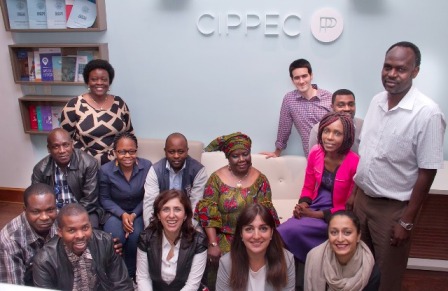South-South Cooperation | OSSREA and CIPPEC co-organized a study tour with professionals from Kenya, Ethiopia, South Africa, Zimbabwe and Tanzania to acknowledge and compare horizontal accountability mechanisms between the Executive and Legislative branches in Argentina and Kenya with the support of ELLA program.

The group counted with the presence of experts from the Legislative branch, civil society, academia and African Think Tanks and was hosted by Jorge Mandelbaum (president), Julia Pomares (executive director), Natalia Aquilino (director of the M&E program), Agustina Suaya (coordinator) and Federico Frascheri (analyst) from CIPPEC.
The objective of the visit was to comparatively deepen knowledge about horizontal accountability mechanisms, which were analyzed in the documents “The deficits in horizontal accountability in Argentina: A tale of two worlds” (written by CIPPEC) and “Horizontal accountability of the Executive to the Legislature in Africa: A case study of Kenya” (written by OSSREA). The following aspects are analyzed in detail: a) State of the Nation report delivery by the President in the Legislative Assembly, b) visits of the Chief of Cabinet to the Congress, c) requests for information from the legislative to the executive and d) reports from the National Audit Office.
Exchange and knowledge meetings were maintained with deputies and former deputies like Nicolás Massot, Carla Pitiot and Manuel Garrido and officers from the Chief of Cabinet office like María Alejandra Svetaz. Participants were also received by the President of the National Audit Office, Mr. Oscar Lamberto, and his team to deepen knowledge about the institutional role in the making and presentation of the reports to the National Congress. Moreover, they visited the Government of the Autonomous City of Buenos Aires to discover how the accountability mechanisms work at the subnational level.
Furthermore, they exchanged views with specialized academicians like Ricardo Lagorio (CARI), Gladys Lechini (UNR), Marisa Pineau, Ana María Mustapic (UTDT) and Marcos Mendiburu; representatives from CSO like María Barón (Legislative Directory, Directorio Legislativo) and Iñaki Albisu (Citizen Power, Poder Ciudadano); representatives from media like Laura Zommer (Checked, Chequeado) and Mariano Ure (FOPEA). Additionally, they could get in touch with María Page (Coordinator of the Political Institutions program) and Sebastián Zírpolo (Coordinator of Communications) at CIPPEC.
As part of the study tour, participants developed and action plan to implement at their own organization with the objective to improve horizontal accountability in their countries.
The study tour is part of the “Evidence and lessons from Latin America” program. ELLA combines research, exchange and knowledge to inspire design and implementation of public policies and development practices based on evidences about what effectively works in different national contexts. The program performs rigorous research, synthesizing existing evidence and researching the gaps in knowledge and evidence. These investigations are carried out by researchers from the Global South countries. Besides, the institution organizes and implements exchange and knowledge programs –known as Learning Alliances- which connect researchers with users of the research in these countries, in order to promote debate around evidence and lessons. Finally, it supports development of networks to promote continuous learning among individuals, organizations and countries through joint research and exchange and knowledge programs.
Access to the photos:



